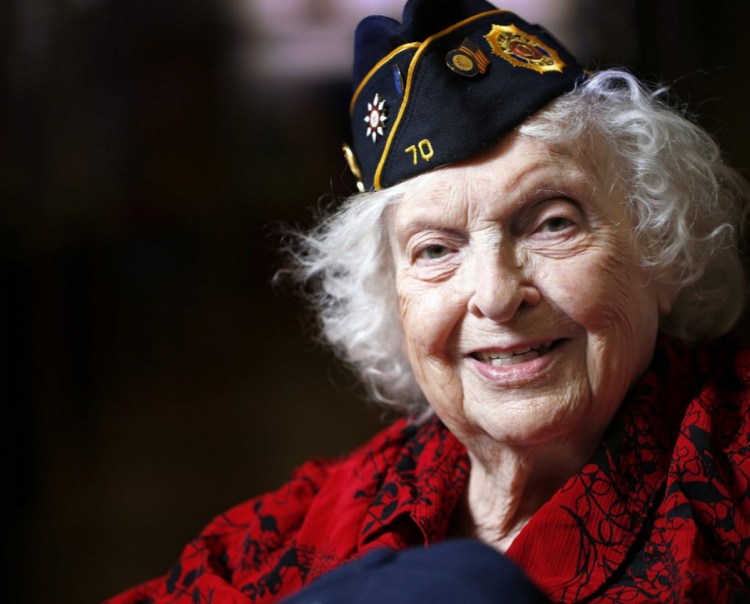Norma Ham Merrill, who as a young woman in World War II broke complex enemy codes and provided critical intelligence to the U.S. military, died Friday at the Maine Veterans’ Home in Scarborough. She was 94.
For decades, the Navy veteran regarded the nature of her military service as a closely held secret, and she only recently told family and friends about it, according to daughter Jane Sullivan of Windham. Getting Merrill to talk about it took some convincing that information about the wartime code-breaking operation already had been declassified, she said.
“I knew she was in the service, but I didn’t know the specifics of it until five or six years ago,” Sullivan said in a telephone interview Sunday night.
Merrill was one of at least 10,000 American women who worked behind the scenes as code-breakers during the war. The women were told constantly that “loose lips sink ships” and ordered to never reveal the scope of their work.
The Portland Press Herald/Maine Sunday Telegram profiled Merrill in November as part of a Veterans Day salute to Mainers who served in the military.
Merrill was born on Christmas Day 1924 in New Hampshire, one of three daughters of a World War I veteran. She told the Press Herald that she had not given much thought to joining the military until President Franklin D. Roosevelt made a stop in Worcester, Massachusetts, where she was working in the purchasing department of a local company. Merrill said she watched as the president, stricken with polio, emerged from a train with a son on either side holding him up.
“You wouldn’t have known he was paralyzed if you hadn’t already known,” she said. “I decided then I would join.”
Upon joining the service, Merrill was administered a battery of aptitude tests, and the Navy discovered she had an intellectual gift for pattern recognition.
She and the other code-breakers worked long hours and, at the end of their shifts, were driven back to their Navy barracks in special buses so they wouldn’t be kidnapped and forced to give up sensitive information. The tight security meant they were largely confined to the barracks during off-hours.
After the war, Merrill returned to New England and applied for a job as a receptionist at a hospital, where a supervisor encouraged her to use the GI Bill to go to school. Inspired by her own childhood battle with polio, she headed to the Maine General Hospital School of Nursing and became a registered nurse.
She married twice, had two children and tended to patients in a 20-bed ward. Later, she worked at the Maine Youth Center in South Portland, now known as Long Creek Youth Development Center, caring for children she felt no one else was looking out for.
“She loved taking care of children,” Sullivan said. “That was something that she was really dedicated to.”
After she retired, Merrill moved to Florida and became the chaplain of the Tampa WAVES group. She gave inoculations to migrant children and dedicated countless hours to raising money for the Washington, D.C., memorial for servicewomen and to support fellow veterans, many of whom were homeless.
Sullivan described her mother as a patriot who did not set out to break down barriers for women but simply wanted to serve her country. Merrill also was a tough person with strong survival instincts, she said.
Merrill was living at an armed forces home in Gulfport, Mississippi, in 2005 when Hurricane Katrina hit, filling the building with water up to her thighs. She was among 400 veterans who were evacuated on 10 buses to Washington, D.C., carrying only what they could hold in their arms. She later returned to Maine to be near Sullivan and her husband, Richard Sullivan, both of whom looked after and cared for Merrill in her final years.
Sullivan said her mother was involved with many civic organizations in addition to being an avid league bowler and a dedicated New England Patriots fan.
“She never missed a Patriots game,” Sullivan said. “She probably knew more about football than some men.”
Merrill is survived by Sullivan and her husband, three grandchildren and three great-grandchildren. A memorial service for friends and family is tentatively scheduled for May.
J. Craig Anderson can be contacted at 791-6390 or at:
Twitter: jcraiganderson
Send questions/comments to the editors.




Success. Please wait for the page to reload. If the page does not reload within 5 seconds, please refresh the page.
Enter your email and password to access comments.
Hi, to comment on stories you must . This profile is in addition to your subscription and website login.
Already have a commenting profile? .
Invalid username/password.
Please check your email to confirm and complete your registration.
Only subscribers are eligible to post comments. Please subscribe or login first for digital access. Here’s why.
Use the form below to reset your password. When you've submitted your account email, we will send an email with a reset code.